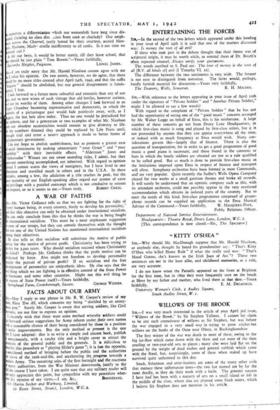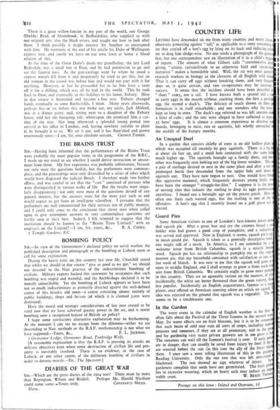WILLOWS OF THE BROOK
SIR,—I was very much interested in the article of your April 3rd issue, " Willows of the Brook," by Sir Stephen Tallents. I cannot lay claim to be any such connoisseur of willows as Sir Stephen, but was before the war engaged in a very small way in trying to grow cricket-bat willows on the banks of the Ouse near Olney, in Buckinghamshire.
The first winter of the war was death to most of these, owing to the big ice-flow which came down with the thaw and cut most of the then yearling or two-year-old sets to pieces ; many also were laid fiat on the ground by the weight of dead rushes and general rubbish which came with the flood, but, surprisingly, some of these when staked up have survived quite unharmed to this day.
Stock, fishermen and otter-hunters are some of the many other evils that menace these unfortunate trees—the two last named are by far the most deadly, as they do their work with a knife. The greatest success I have had has been with a nursery of sets on a small island or lob in the middle of the river, where also are planted some black osiers, which I believe Sir Stephen does not mention in his article. There is a great willow-fancier in my part of the world, one George (Daddy) Read, of Sharnbrook, in Bedfordshire, who supplied us with our original sets, also the black osiers, and taught me how to look after them. I think possibly it might interest Sir Stephen to correspond with him. He mentions at the end of his article his Duke of Wellington cypress tree, and surely we have on our own lawn at home a blood relation of this.
At the time of the Great Duke's death my grandfather, the late Lord Redesdale, was a small boy at Eton, and he had permission to go and see the funeral pass. As the gun-carriage went by where he stood a cypress wreath fell from it and .desperately he tried to get this, but an old woman in the crowd was before him and would not part with it for anything. However, at last he persuaded her to let him have a cone off it for a shilling, which was all he had in the world. This he took back to Eton, and eventually in the holidays to his home, Exbury. Here in due course it flourished and became a fine tree. Exbury changed hands eventually to some Rothschilds, I think. Many years afterwards, perhaps five or six before this war broke out, my uncle, Jack Mitford, was at a dinner party, and, sitting next to a daughter of the Exbury house, told her the foregoing tale, whereupon she promised him a cut- ting of the tree. Not long afterward a splendid young potted tree arrived at his office in London, and, having nowhere suitable to plant it, he brought it to us. We set it out, and it has flourished and grown enormously since.—I am, Sir, your obedient servant, GEORGE FARRER.



























 Previous page
Previous page